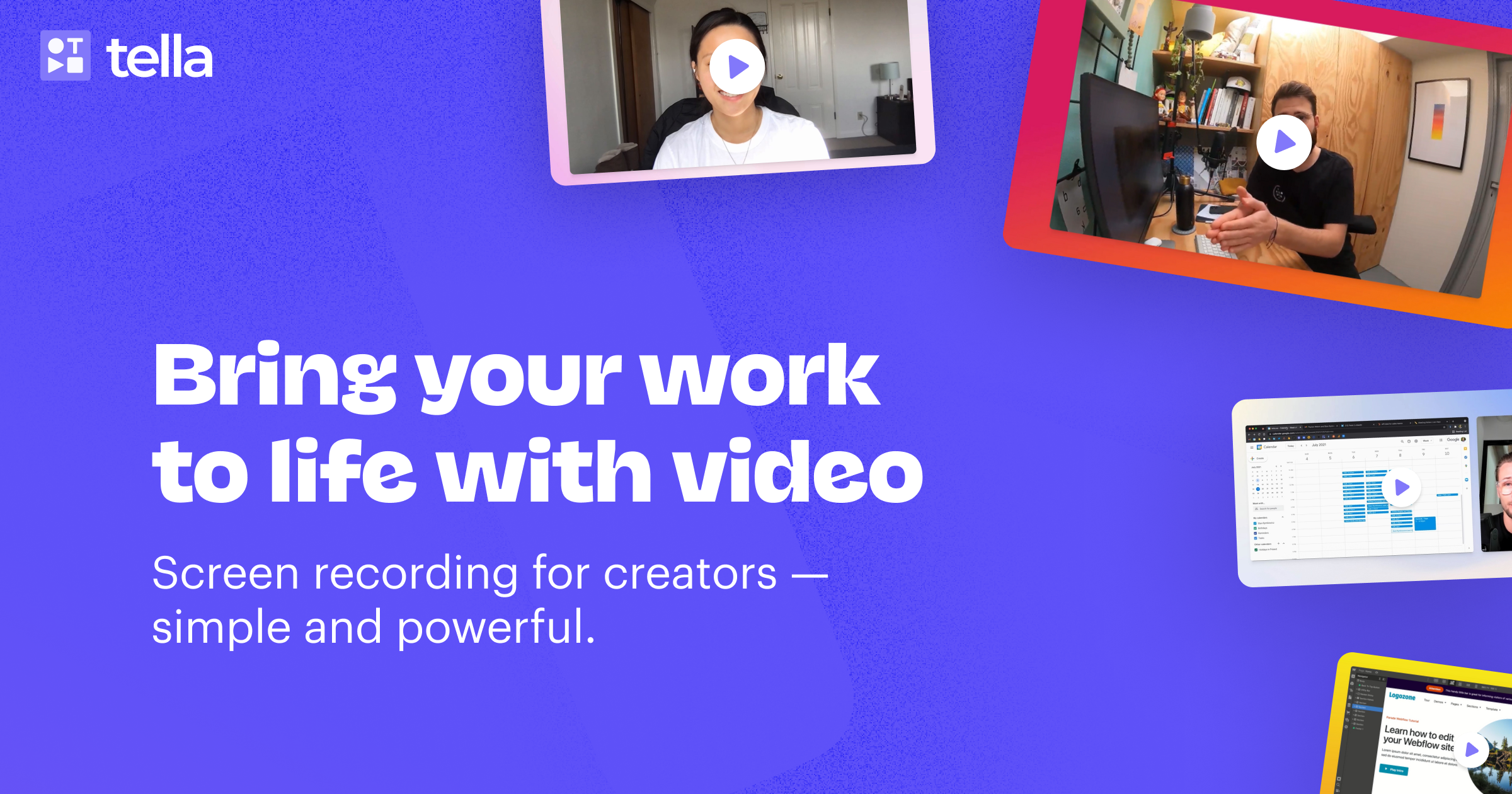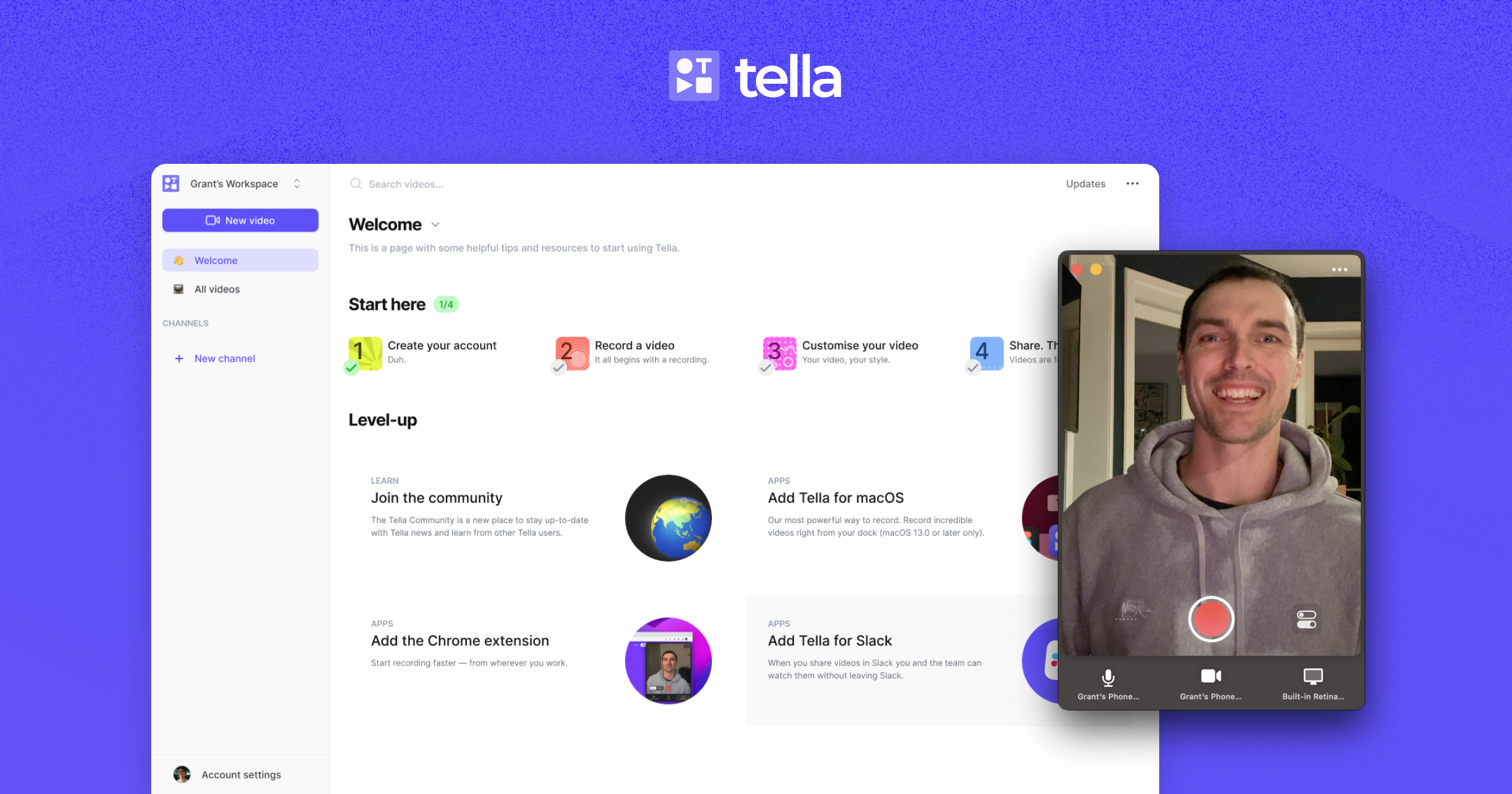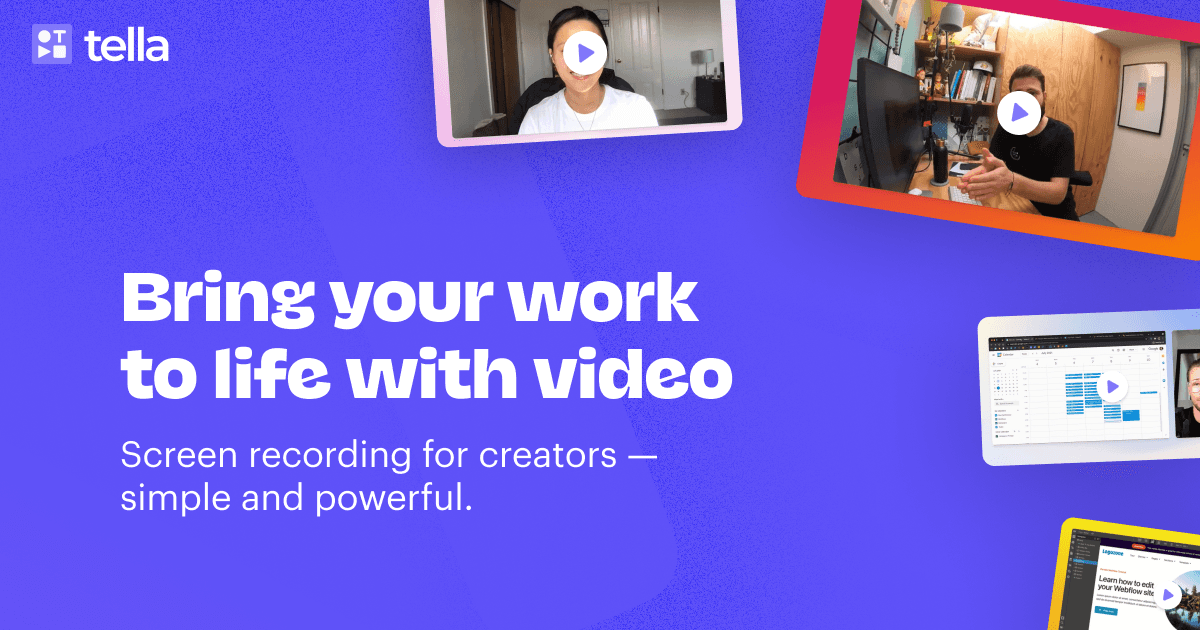What’s Tella?

Tella is an app that allows users to simultaneously record their screen and camera. As more and more activities take place on screens, we believe that people have stories to tell and content to share.

Tella aims to transform screen and camera recording into its own unique format by providing creative tools and making it enjoyable for users to create engaging videos on their computers.
What's your background, and how did you come up with the idea?
My background is quite simple. I studied commerce and business before working in various companies, eventually landing in a tech company about ten years ago. That's when I got involved in product management and related fields.
The idea for Tella came from when my co-founder and I were working at InVision, a design software company. Before the pandemic, they were already an 800-person fully remote company, which was quite unusual at the time.
One of the practices they implemented was requiring product teams to post videos about their work in a Slack channel. This allowed everyone in the company, from sales to customer support, to watch and learn about ongoing projects at their own pace. We noticed that the quality of the videos greatly impacted engagement and communication within the company.
However, there wasn't a user-friendly way to create these work videos. Options were either too basic, like simple screen recordings, or too complex, like spending hours on a video editor. So, we decided to develop an app that makes it easy and fun to create work-related videos, and that's how Tella was born.
When did you launch the business?
We launched our business publicly in June 2020 after starting to work on it earlier that same year. We had a prototype ready by May 2020, which helped us secure a spot in Y Combinator. With the idea and a prototype in hand, Y Combinator's fast-paced environment pushed us to quickly launch and test our product to see how it would perform.
How was the YC process?
The Y Combinator process was definitely worth it, despite some downsides. We were part of the first fully remote batch due to the pandemic. The batch before us had to be cut short, and participants were sent home midway.
However, our batch was well-planned for remote participation, even though we missed out on some of the valuable in-person experiences. Overall, it was an incredible opportunity to be in Amsterdam and virtually connect with Silicon Valley, gaining access to an extensive network and learning a great deal.
In the early stages of the business, how did you acquire customers?
In the early stages of the business, our customer acquisition strategy was quite straightforward. We focused on launching and continuously shipping new features, trying to create momentum by doing something interesting. We didn't have a specific growth area; instead, we shared updates on Twitter and maintained a newsletter to showcase the new features we were developing.
During the initial phase, I also conducted a lot of one-on-one outreach on Twitter. I would send personalized videos made with Tella to potential users, introducing myself and demonstrating the capabilities of our platform. This approach helped us gain some key users who have remained loyal to our product and provided valuable feedback.
While we didn't discover a killer growth channel as some startups do, our strategy helped us find committed early users who became strong advocates for our product and supported us in various ways, which has been extremely beneficial.
How's the business doing now?
The business is doing quite well now, but the initial year and a half were quite challenging. After completing YC, we operated blindly, fueled by adrenaline, and focused on building features without truly addressing underlying issues. By the start of 2021, we realized our product wasn't working as intended and needed to make significant changes.
We spent a considerable amount of time rebuilding our platform, hoping it would help us grow. This process was daunting and time-consuming, but when we relaunched it in mid-2021, we saw improvements in the product's functionality, allowing users to create more interesting content.
For the rest of 2021 we started to see some growth, with things truly starting to pick up towards the end of 2021. Since then, we've seen consistent growth in both user base and revenue, and this year is off to a really great start.
What marketing channels are you working well to acquire new customers?
Last year, we had great success experimenting with influencer partnerships. We collaborated with genuine users of our product who had substantial audiences. This turned out to be one of our best moves, as these superfans and advocates shared their experiences with our product, and it spread like wildfire.
Platforms like Twitter and YouTube have been helpful, especially YouTube, as the video aspect complements our product. However, replicating the initial success we had on YouTube proved to be a challenge, as authenticity is key and hard to duplicate.
We then shifted our focus to TikTok, as it was easier to find influencers and facilitate quicker transactions. Although the success of TikTok is somewhat intangible and difficult to attribute, we still gain many users from the platform. Users often mention TikTok when filling out our form, so there's definitely a connection.
Even though we were relatively late to the TikTok influencer party, we realized the importance of having a presence on the platform when targeting consumers. There's a sense of FOMO, and being on TikTok helps create buzz. While the ROI may not be as great as we would like it to be, TikTok remains one of our channels for customer acquisition.
Do you also focus on a lot of organic stuff and content marketing?
Last year, we made a considerable effort in content marketing, but I was rather impatient about it, expecting immediate results. This mindset was naive, and we eventually stopped working on content marketing. However, as time passed, we began to see the fruits of our labor, with our posts ranking well and attracting significant visitors.
We are considering resuming our content marketing efforts, recognizing its potential for our business. One challenge faced by small startups like ours is that, while we can experiment with various strategies, it's difficult to excel in all of them consistently. As a result, we must carefully choose our battles and prioritize our focus to maximize results.
What has been your biggest achievement so far?
It isn't easy to pinpoint a single achievement as the biggest, but there have been a few significant revenue milestones that we're proud of. I believe our greatest accomplishment lies in our persistence during the early days, as we managed to overcome a challenging period. The compounding effect of our hard work has started to manifest in the form of consistent, regular growth.
Our goal for this year is to continue on this upward trajectory and either gain full control of our destiny or successfully raise a Series A round of funding.
What has been the biggest challenge in your journey?
Our biggest challenge has been mastering marketing. As a natural product person, I've had to be more deliberate about marketing and learn to be comfortable with it. It's been a learning experience to develop a rhythm and hone our marketing skills. I recently spoke with another founder who switched their focus entirely from product to marketing, resulting in better business performance. This conversation made me consider if we need to adjust our approach.
Another significant challenge we've faced is dealing with the complexities of video. When we started, we knew very little about the video, which led to difficulties in creating the first version of our product. Video presents numerous technical challenges, including codecs, software, hardware, and browser compatibility issues. Despite these challenges not garnering as much attention as other hard domains like AI, we must dig deep to solve these problems, as users expect the product to work seamlessly.
One example of this is the compatibility issues with Safari. While a majority of our users are on Chrome, we strive to make our browser tool work across all platforms. We've encountered cases where Safari presents difficulties, prompting us to consider if we should focus more on optimizing for Safari to ensure better compatibility with other browsers.
How many people are currently working in your company?
We currently have a team of four, including three engineers and myself. We are also actively looking to hire a marketing specialist in the near future to strengthen our marketing efforts.
What is something you know now that you wish you had known when you started the business?
While there's certainly value in the innocence of not knowing certain things when starting a business, as it encourages you to try new approaches and take risks, there are some aspects I wish I had known.
However, it's important to note that if we had known everything from the beginning, we might not have attempted certain endeavors, which could have been detrimental to our growth. Being new to the startup world, video, and other aspects of our business allowed us to explore without being weighed down by previous experiences or biases.
How do you keep yourself motivated?
For our team, motivation comes from progress. We tend to get agitated when things slow down, growth stagnates, or we experience a decrease in users or revenue. This pushes us to identify what changes we need to make in order to improve our performance and move forward more effectively.
We strive to make consistent progress, whether in shipping products faster or increasing our user base and revenue. After a challenging first year we're determined to avoid being in that situation again. Our motivation lies in persevering and ensuring we are rewarded with tangible progress, which drives our day-to-day efforts.
Do you have any advice for any aspiring entrepreneurs?
My main advice is to have conviction in your idea. When you're thinking about starting a business, there will be many factors that could discourage you or stand in your way, such as lifestyle changes or personal commitments. If you genuinely believe in your idea, you need to take the leap and give it a try.
Don't get hung up on the details – just start. While this may seem like simple advice, it's crucial to embrace the unknown and forge ahead. As I mentioned earlier, there were things we didn't know when we started, which, in retrospect, were beneficial to our journey. If you believe you have something worth pursuing, go for it.
What are your plans for the next 6 to 12 months?
Over the next six to 12 months, we plan to focus on hiring, particularly in the marketing department, as it's currently our weakest point. We aim to create a robust marketing machine to drive growth. Additionally, we may look into expanding our product team by hiring designers and engineers.
Our primary goal is to sustain growth and move from a seed-stage company to a more mature one, either by achieving a decent level of profitability to control our destiny or by raising additional funding to fuel our growth. This will involve improving our marketing efforts and continually enhancing our product.
As for what sets us apart from competitors like Loom, Tella is particularly well-suited for sharing videos externally, such as with customers or potential clients. Our platform offers more creative control, enabling users to make a strong impression and effectively showcase their products or services.
Tella goes beyond screen recording by providing creative tools and various recording options to create unique and engaging videos. While Loom and other tools may be suitable for quick internal communication, Tella excels in helping users create impactful, externally-facing content.
Where can people get in touch?
Visit our website www.tella.tv, or reach out to me on Twitter here.








